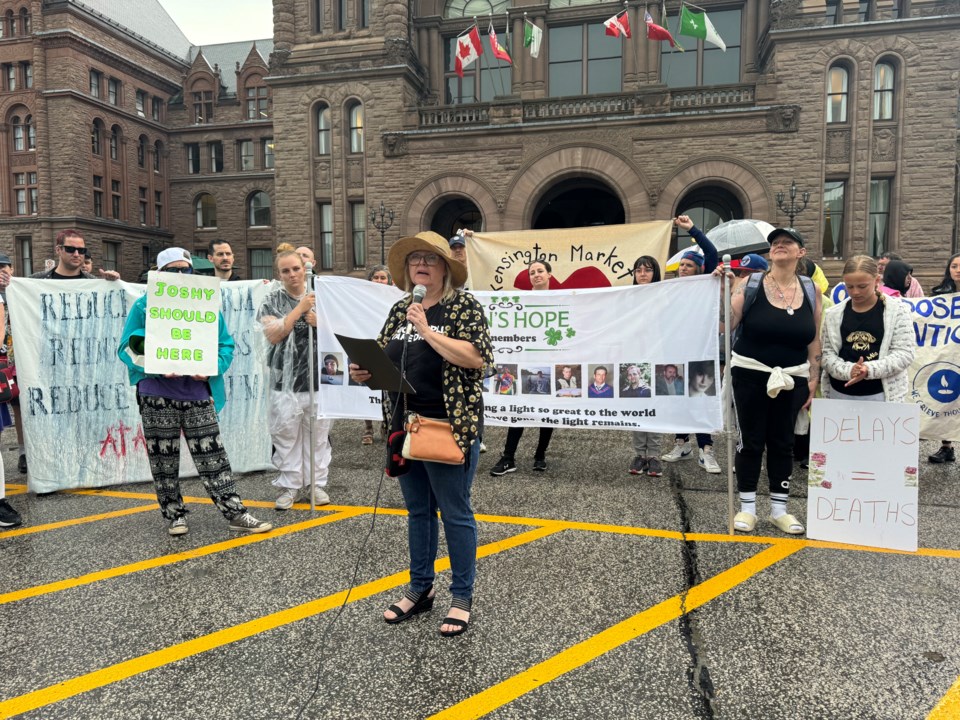EDITOR’S NOTE: this article originally appeared on The Trillium, a Village Media website devoted to covering provincial politics at Queen’s Park.
For years, Christine Nayler has been trying to convince politicians to fund supervised consumption sites.
Today, she's among the advocates and experts warning that the province’s decision to shut down 10 supervised consumption sites next year — and to prevent new ones from opening — will mean more people will die.
The Registered Nurses Association of Ontario (RNAO) called it a “death sentence that will lead to unsafe communities and higher costs.”
The Centre for Addiction and Mental Health (CAMH), not quite so blunt, said the sites are “evidence-based and life-saving interventions, known to reduce the incidence of fatal overdoses, help reduce the transmission of HIV, hepatitis C, and other blood-borne infections, and increase referrals to treatment.”
Nayler had this message for the politicians responsible: "You know this is a death sentence for people, and I don't know how you live with yourselves, how you're going to sleep at night.”
Three months ago, she came to Queen's Park with other mothers who'd lost children to toxic drugs to plead for funding for more supervised consumption sites — not at a meeting inside, but outside in the rain talking into a microphone, hoping someone was listening.

"I was a registered early childhood educator teaching kindergarten, and now I do this," she said. "I stand before groups of people and lay my grief bare before them in hopes of opening hearts and changing minds so that no other mother has to know the irrepressible anguish of laying a child to rest."
Before Nayler's son, Ryan, died, he'd advocated, unsuccessfully, for a supervised consumption site in Barrie. An application for a Barrie site submitted in 2021 went unanswered by the province until it was withdrawn earlier this year.
On Tuesday, Health Minister Sylvia Jones announced the government is closing 10 of the province's supervised consumption sites and banning new ones. Instead, it will spend $378 million to create 19 Homelessness and Addiction Recovery Treatment (HART) hubs that will not allow supervised consumption, safer supply or needle exchanges.
Jones denied that her government’s decision will lead to increased deaths.
“People are not going to die,” she said. “They’re going to get access to service. You know, I do not call watching someone inject an illicit drug to be health care in the Province of Ontario. We need to do better, and we can do better, and we’re going to do that by ensuring that people who have an addiction, people who have a mental health issue, have a pathway to treatment and to service.”
However, advocates for supervised consumption sites say they are a pathway to what treatment options are available when a drug user seeks treatment.
"Treatment is part of the solution, but it's only one tool in the toolbox," Nayler said. "All the evidence points to having a comprehensive response to address this issue and keep people alive — and they know that. Their focus on treatment only is going to cost lives — and they know that — and they're just ignoring the evidence and the facts."
Nayler said she'd grown up understanding the abstinence-based model that had helped her father recover from alcohol-use disorder. It was through Ryan that she came to realize it was not a one-size-fits-all solution.
He was a gifted writer and musician with a master's degree but struggled with his mental health and used drugs to self-medicate. In Nayler's view, politicians who are "scoring political points" by shutting down safer ways of using drugs deem the lives of people like her son as "disposable."
While the public sees the sites with a lot of stigma, politicians have a responsibility to educate themselves on the scientific evidence and expert advice, which overwhelmingly support supervised consumption sites, she said.
Two expert reports commissioned by the province ahead of its decision recommended the government expand and better fund the sites, not shut most of them down.
“Nurses are enraged that we will see more preventable deaths. These numbers will increase because the Ford government has made it clear that people who use substances are disposable.” - RNAO President and Nurse Practioner Lhamo Dolkar.
Premier Doug Ford defended his government's decision to act against that advice at a press conference Wednesday, calling supervised consumption sites a "failed policy," saying he’d listened to residents who live near the sites instead.
"I've listened to the people in the neighbourhoods. I've consulted with them. I've been getting endless phone calls about needles being in the parks, needles being by the schools and by the daycare," Ford said. "That's unacceptable."
The province hasn't seen drug use "get better" since the sites opened, he said.
"This was supposed to be the greatest thing since sliced bread. It's the worst thing that could ever happen to a community to have one of these safe injection sites in their neighbourhood," added the premier.
However, proponents of the sites are warning that closing them down will lead to increased public disorder and drug use, not less.
"People are not going to stop using drugs because these sites close down,” Nayler said. “What's going to happen is the drug use is going to spill out into the public places, and there's going to be more needles that are, you know, discarded in public and stuff. Communities are going to be less safe.”
Ford disagrees.
"Those are just typical scare tactics that these folks have been saying for years," he said.
“The loss of supervised consumption sites and needle exchange programs will cause harm to people and communities across the province and put pressure on other parts of the health care system, including already busy emergency departments and emergency medical services.” — Centre for Addiction and Mental Health (CAMH)
The government’s decision to overhaul its rules for supervised consumption sites comes just over a year after a Toronto mother, Karolina Huebner-Makurat, was killed by a stray bullet fired near the South Riverdale Community Health Centre, which houses a provincial supervised consumption site.
“It was tragic and it was heartbreaking, and I feel for that family and everyone that was impacted by that loss,” said Nayler. “But we can't use one incident and one death as an excuse to condemn so many other people to death.”
Shootings and stabbings happen outside of bars, and we don’t launch yearlong investigations and shut them down, she added.
“More than 45,000 Canadians have lost their lives to toxic drugs, and that's not the full impact of the crisis, because those were people's loved ones, and so a whole family is impacted by that loss, and a whole community,” said Nayler. “It just sends ripples and ripples and ripples. Our family has not been the same — I say I have a before and an after life.”
In her view, it shouldn’t take personal loss for politicians to do the right thing.
"Eventually, we're all going to be affected by the loss of somebody that we loved and cared about, and then that's when we're going to be like, 'Oh, well, maybe now I'm going to care,'" she said. "Well, maybe we need to care now, because it's impacting all of our communities."
